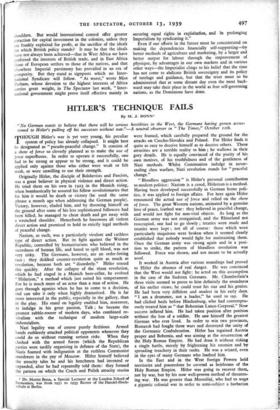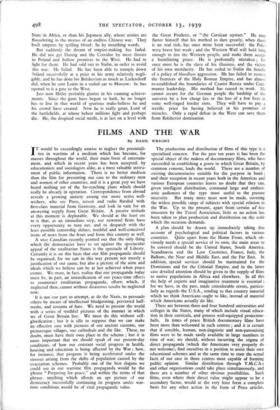HITLER'S TECHNIQUE FAILS
By M. J. BONN*
"No German wants to believe that there will be serious hostilities in the West, the Germans having grown accus- tomed to Hitler's pulling off his successes without war."—A neutral observer in " The Times," October Ink THOUGH Hitler's war is yet very young, his peculiar system of policy has already collapsed. It might best be designated as " pseudo-peaceful change." It consists of a show of force so cleverly planned as to make the use of force superfluous. In order to operate it successfully, one had to be strong or appear to be strong, and it could be applied only against those who either were weak or felt weak, or were unwilling to use their strength.
Originally Hitler, the disciple of Bolshevists and Fascists, was a great believer in physical violence and direct action. He tried them on his own in 1923 in the Munich rising, when bombastically he assured his fellow revolutionaries that for him it would be death or victory (he used the same phrase a month ago when addressing the German people). Victory, however, eluded him, and by throwing himself on the ground after some of his less sophisticated followers had been killed, he managed to cheat death and get away with a wrenched shoulder. Henceforth he foreswore all violent direct action and promised to hold to strictly legal methods of peaceful change.
Nazism, as such, was a particularly virulent and tuthless type of direct action. But its fight against the Weimar Republic, controlled by humanitarians who believed in the sacredness of human life, and hated to spill blood, was not very risky. The Germans, however, are an order-loving race ; they disliked counter-revolution quite as much as revolution, because both are " disorderly." Hitler sensed this quickly. After the collapse of the sham revolution, which he had staged in a Munich beer-cellar, he evolved " Hitlerism," a method which just suited his temperament. For he is much more of an actor than a man of action. He goes through agonies when he has to come to a decision, and can take it only when highly dramatised. He is far more interested in the public, especially in the gallery, than in the play. His stand on legality enabled him, moreover, to indulge in his great passion, Talk ; he became the greatest rabble-rouser of modern days, who combined re- vivalism with the technique of modern large-scale industrialism.
Nazi legality was of course purely fictitious. Armed hands ruthlessly attacked political opponents whenever they could do so without running serious risks. When they clashed with the armed forces (which the Republican parties were tardily organising in defence of the State), the Nazis foamed with indignation at the ruthless Communist murderers in the pay of Moscow. Hitler himself believed the atrocity tales he and his henchmen had invented or expanded, after he had repeatedly told them: they formed the pattern on which the Czech and Polish atrocity stories * Dr. Moritz Bonn, a Special Lecturer at the London School of Economics, was from 1931 to 1933 Rector of the Handel-Hoch- schule at Berlin. were framed, which carefully prepared the ground for the attacks on Czecho-Slovakia and Poland. For Hitler finds it quite as easy to deceive himself as to deceive others. These atrocities are a terrible reality to him ; he wallows in their gory details. He is equally convinced of the purity of his own motives, of his truthfulness and of the gentleness of Nazi methods. Whilst Communists indulge in never- ending class warfare, Nazi revolution stands for " peaceful change."
" Bloodless aggression " is Hitler's personal contribution to modern politics: Nazism is a creed, Hitlerism is a method. Having been developed successfully in German home poli- tics, it was applied to foreign affairs. For here again Hitler renounced the actual use of force and relied on the show of force. The great Western nations, animated by a genuine love of peace, loathed war: they believed in peaceful change, and would not fight for non-vital objects. As long as the German army was not reorganised, and the Rhineland not reoccupied, one had to go slowly ; treaties were made and treaties were kept ; not all of course: those which were particularly iniquitous were broken when it seemed clearly established that nobody would fight for maintaining them. Once the German army was strong again and in a posi- tion to strike, the pattern of bloodless revolution was followed. Force was shown, and not meant to be actually used.
It worked in Austria after various soundings had proved to Hitler the absence of real danger. He was convinced that the West would not fight: he acted on this assumption in the case of the Sudeten Germans. Mr. Chamberlain's three visits seemed to prove to him definitely the soundness of his earlier views; he could trust his star and his genius. He had been very diffident and modest in his early days. " I am a drummer, not a leader," he used to say. He had clicked heels before Hindenburg, who had contemptu- ously treated him as " that Bohemian Lance-Corporal." Now success inflated him. He had taken position after position without the loss of a soldier. He saw himself the greatest German who ever lived. In order to win two provinces, Bismarck had fought three wars and destroyed the unity of the Germanic Confederation. Hitler has regained Austria proper and Bohemia, and was aiming at the resurrection of the Holy Roman Empire. He had done it without risking a single battle, merely by frightening his enemies and by spreading treachery in their ranks. He was a wizard, even in the eyes of many Germans who loathed him.
In the East and in the West foreign Powers held territories and possessions he coveted as heirlooms of the Holy Roman Empire. Hitler was going to recover them, not by war, but by his now well-proven method of threaten- ing war. He was greater than Mussolini, who had to wage a gigantic colonial war in order to semi-subject a barbarian State in Africa, or than his Japanese ally, whose armies are floundering in the morass of an endless Chinese war. They built empires by spilling blood: he by mouthing words.
But suddenly the dream of empire-making has faded. He did not get Danzig and the Corridor by mere threats to Poland and hollow promises to the West. He had to fight for them. He had sold out to Stalin, in order to avoid this war. He failed. He has been able to trample down Poland successfully at a price to his army relatively negli- gible, and he has done for Bolshevism as much as Ludendorff did, when he sent Lenin in a sealed car to Moscow: he has opened to it a gate to the West.
Just now Hitler probably glories in his cunning achieve- ments. Since the guns have begun to bark, he no longer has to live in that world of spurious make-believe he and his crowd have created. Now he is really great, Lord of the battlefields, at whose behest millions fight and perhaps die. He, the despised social misfit, is at last on a level with the Great Frederic, or " the Corsican upstart" He may flatter himself that his method to dare greatly, when there is no real risk, has once more been successful: the Poles were brave but weak ; and the Western Wall will hold long enough to tire the Western people, and make them accept a humiliating peace. He is profoundly mistaken ; for once more he is the slave of his illusions, and the victim of his own mendacity. He has ceded to Stalin the benefit of a policy of bloodless aggression. He has failed to restore the frontiers of the Holy Roman Empire, and has almost re-established the boundaries of Czarist Russia under Com- munist leadership. His method has ceased to work. He cannot secure for the German people the lordship of the universe by a few cheap lies or the loss of a few lives in some well-staged border riots. They will have to pay a terrific price for having believed in his promises of miracles. Only a rapid defeat in the West can save them from Bolshevist domination.











































 Previous page
Previous page